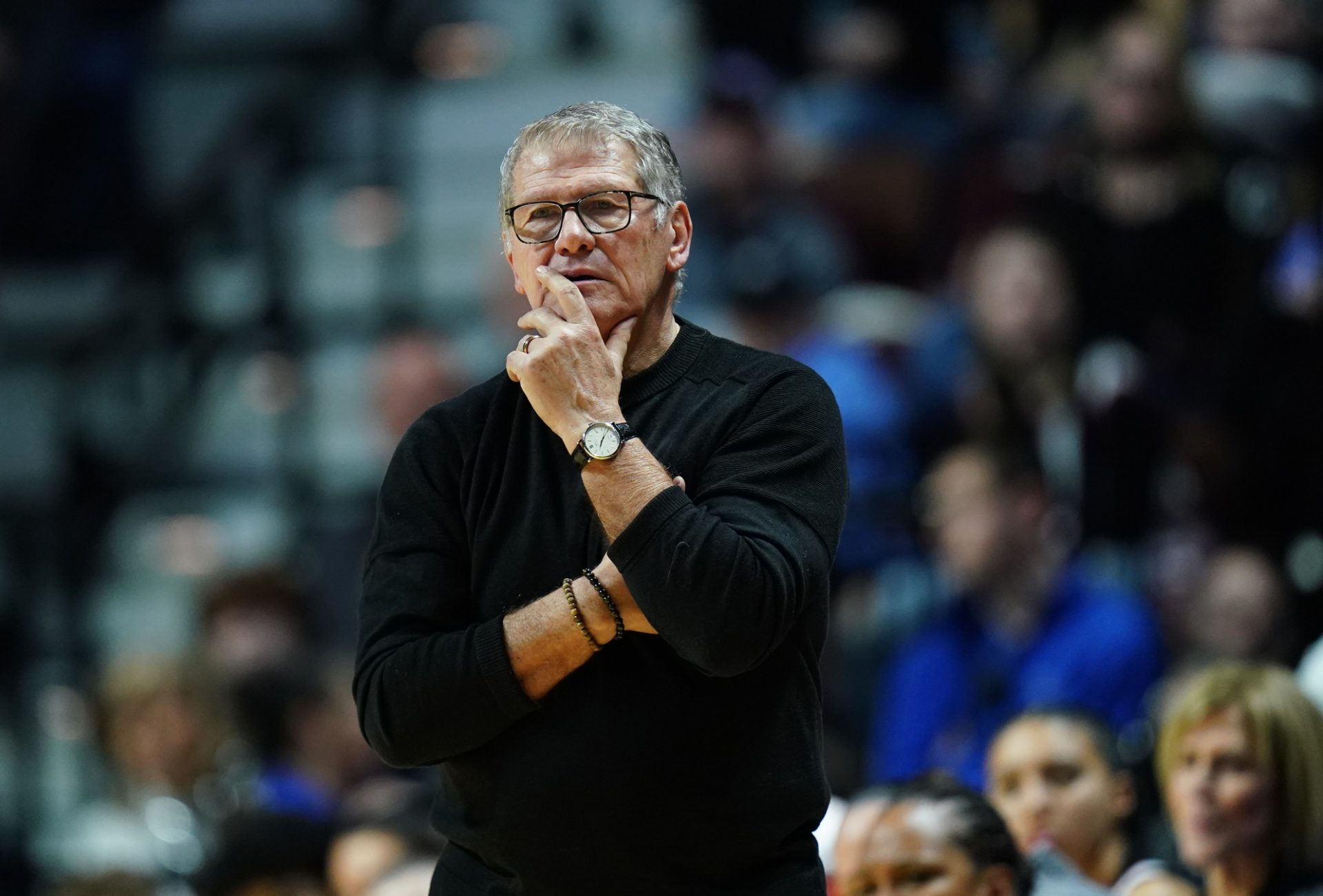Women’s college basketball has evolved from obscurity to national prominence largely through the vision and determination of elite coaches who transformed programs into dynasties. These tactical masterminds didn’t just collect trophies. They revolutionized strategic approaches, shattered glass ceilings, and elevated the entire sport’s competitive standard.
Their influence transcends statistics, creating legacies through innovative systems that changed basketball fundamentals. From defensive innovations to offensive evolutions, these coaching titans have built distinctive program cultures while mentoring generations of players and coaches who continue spreading their basketball philosophies throughout the sport. Here are the rankings of the top nine best women’s basketball coaches.
Top 9 Coaches in Women’s Basketball History
Geno Auriemma, UConn
Since 1985, Auriemma has transformed UConn into a basketball dynasty, winning an unprecedented 11 NCAA championships and appearing in 22 Final Fours. His tactical genius created the historic 111-game winning streak from 2014 to 2017, establishing benchmarks in collegiate sports that may never be surpassed.
Born in Italy and raised in Pennsylvania, Auriemma’s intense coaching style pushes players beyond perceived limits while building strong personal connections.
Auriemma’s player development system has consistently transformed talented recruits like Diana Taurasi and Breanna Stewart into champions at UConn and stars in the WNBA. His offensive execution philosophy revolutionized women’s basketball, emphasizing skill development over physical attributes.
Pat Summitt, Tennessee
Coaching Tennessee from 1974 to 2012, Summitt amassed 1,098 career wins and 8 NCAA championships, setting the standard for excellence in women’s basketball. Her Lady Vols teams captured 32 SEC championships while becoming synonymous with disciplined championship-caliber basketball.
Born in Clarksville, Tenn., Summitt’s demanding approach developed elite athletes and strong women, with an incredible 100% graduation rate among her four-year players.
Summitt’s player development prowess was evident in stars like Tamika Catchings and Chamique Holdsclaw, who excelled under her mentorship before pursuing successful professional careers.
Summitt’s greatest achievement was forcing the basketball world to respect women’s sports during an era of institutional resistance, creating visibility through competitive excellence when few others could break through these barriers.
Tara VanDerveer, Stanford
VanDerveer’s remarkable career at Stanford spans nearly four decades, accumulating over 1,200 wins and three NCAA championships across 29 years (1992-2021). Her teams have claimed 14 Pac-12 titles and made 13 Final Four appearances, establishing Stanford as a perennial contender.
Born in Massachusetts, VanDerveer’s analytical coaching style emphasizes fundamentals and intelligent gameplay while adapting strategies to maximize player strengths.
Her player development approach has produced stars across generations, from Jennifer Azzi in her earlier years to Nneka Ogwumike in more recent times. VanDerveer’s basketball brilliance emerges through tactical flexibility rather than a rigid system.
Her 1990s championships featured dominant inside play, her 2000s teams emphasized perimeter shooting and her 2021 championship showcased versatile defensive switching, each adaptation masterfully designed around her roster’s capabilities while maintaining Stanford’s elite academic standards.
Kim Mulkey, LSU
Mulkey stands alone as the only coach to win national championships at multiple schools, having claimed three titles at Baylor before quickly transforming LSU into a contender.
Her teams are known for defensive rigor and efficient play, reflecting her competitive nature as a former national champion player at Louisiana Tech. Born in California and raised in Louisiana, Mulkey’s passionate coaching style inspires fierce loyalty from her players while establishing championship expectations immediately.
KEEP READING: Top 10 Hilarious Kim Mulkey Memes That Took Over the Internet
Her player development skills are evident in stars like Brittney Griner and Odyssey Sims, who thrived under Mulkey’s guidance at Baylor before successful professional careers.
Mulkey’s defensive innovations, particularly her use of hybrid zone coverages, emerged from her playing experience under legendary Louisiana Tech coach Leon Barmore, who created a coaching philosophy that blends old-school fundamentals with modern adaptations.
Sylvia Hatchell, North Carolina
Before her 2019 retirement, Hatchell led North Carolina to remarkable success, including the 1994 NCAA Championship and three Final Four appearances during her 33-year tenure. Her 1,023 career victories placed her among the sport’s winningest coaches, building the Tar Heels into a perennial power.
Born in Gastonia, N.C., Hatchell’s fast-paced offensive philosophy and emphasis on resilience defined her teams throughout her career.
Hatchell’s player development success showed in stars like Ivory Latta who flourished at UNC before moving to the WNBA. Her greatest contribution came through elevating regional programs to national prominence.
After building Francis Marion into an AIAW power, she transformed North Carolina from an ACC afterthought to women’s basketball royalty. Her family-like team atmosphere and focus on player development extended beyond basketball, shaping generations of women while advocating for cancer awareness following her own battle with leukemia.
C. Vivian Stringer, Rutgers
Stringer made history as the first coach to lead three different programs to the Final Four, demonstrating exceptional adaptability and basketball knowledge. With over 1,000 career victories, her coaching philosophy centers on suffocating defense and disciplined execution.
Born in Pennsylvania, Stringer’s demanding yet nurturing approach has made her a maternal figure to countless players while maintaining elite competitive standards.
Her player development impact is evident in standouts like Sue Wicks and Cappie Pondexter, who developed into complete players at Rutgers before successful professional careers. Where other coaches succeeded with resource advantages, Stringer built championship contenders against institutional headwinds.
Her Cheyney State program reached the first-ever NCAA championship with minimal funding, while her Rutgers teams consistently outperformed their resources, a testament to her ability to instill a championship mentality regardless of circumstance.
Barbara Stevens, Bentley University
Stevens built Bentley University into a Division II powerhouse, amassing over 1,000 career wins and the 2014 national championship during her remarkable tenure. Her player-centered coaching philosophy emphasized both athletic achievement and personal growth, creating a model program at the Division II level.
Born in Southbridge, Mass., Stevens focused on developing complete student-athletes who succeeded both on the court and academically.
Her coaching brilliance emerged through tactical innovations that belied Bentley’s Division II status; her teams utilized sophisticated offensive schemes featuring multiple options and reads typically found only in professional basketball. Though less connected to WNBA pipelines, Stevens’ players achieved tremendous success at collegiate and international levels.
Her induction into the Naismith Memorial Basketball Hall of Fame recognizes contributions often overlooked at non-Division I programs, establishing Bentley as a model of consistency through fundamentally sound basketball.
Lindsay Gottlieb, USC
Gottlieb’s strategic coaching acumen was evident at California, where she led the Golden Bears to their first-ever Final Four appearance in 2013 and seven NCAA tournament appearances.
Since 2021, she has been rebuilding USC’s program with the same methodical approach. Born in Scarsdale, New York, Gottlieb’s approachable leadership style and analytical basketball mind make her popular among players while respected by peers in the coaching community.
Her player development philosophy emphasizes versatility, which translates to professional success, as exemplified by her work with Layshia Clarendon at California. Gottlieb’s impact extends beyond win-loss records, focusing on building program culture and team chemistry.
Now rebuilding USC, Gottlieb represents the modern coach who blends technical expertise with emotional intelligence that resonates with today’s athletes, establishing herself as an influential voice in contemporary women’s basketball.
Amy Ruley, North Dakota State
Ruley dominated Division II basketball during her North Dakota State tenure, capturing five national championships with teams known for discipline and execution.
Her balanced coaching approach emphasized fundamentals while developing complete student-athletes who excelled academically. Born in Lowell, Ind., Ruley’s disciplined yet supportive coaching style created the foundation for unprecedented success at NDSU.
Her program’s success against Division I opponents demonstrated coaching principles transcend resource disparities. While her players primarily achieved success in college and international leagues rather than the WNBA, Ruley’s development of complete student-athletes emphasized academic excellence alongside athletic achievement.
KEEP READING: What’s the Lowest Seed To Ever Win the NCAA Women’s Tournament?
Her Women’s Basketball Hall of Fame induction recognizes contributions too often overshadowed by Division I achievements, establishing a blueprint for mid-major success that influenced programs nationwide seeking sustainable excellence without Power Five resources.
The collective impact of these coaching pioneers extends far beyond championships and accolades. Through tactical innovation, program building, and tireless advocacy, they transformed women’s basketball from an afterthought to a showcase competition. Their greatest achievement remains creating pathways for future generations of coaches and players in a sport now celebrated for its competitive excellence and player development.
Don’t miss a moment of March Madness! Download your 2025 NCAA Tournament printable bracket and stay on top of every game, matchup, and Cinderella story. Get yours now!



